
|
It's often said that you shouldn't take work too personally. However, the reality is that the relationship we have with our careers and jobs is often very intimate, making it difficult to separate our emotions. Most people spend more time at work than they do at home, or at least they did before the COVID-19 pandemic made remote work the standard for millions of Americans. This serves to explain why the relationship we have with our jobs has such an impact on our mental health.
The pandemic didn't just blur the lines of where we work, but also when we work. Proper work-life balance has long been linked to mental health and wellness, and life in lockdown made it difficult for many remote and hybrid employees to set boundaries that allowed them to protect their time.
Now, possibly more than ever before, the relationship between work and self-worth is incredibly strong. To find out just how intimately our work performance is connected to our self-esteem, we surveyed over 1,000 people about how their personal and professional lives intersect on an emotional level. Read on as we explore how people feel their mood, home life, and interpersonal relationships are affected by positive work performance and job satisfaction.
Being good at your job and feeling positive about the work you produce is linked with higher levels of self-esteem, according to survey respondents.
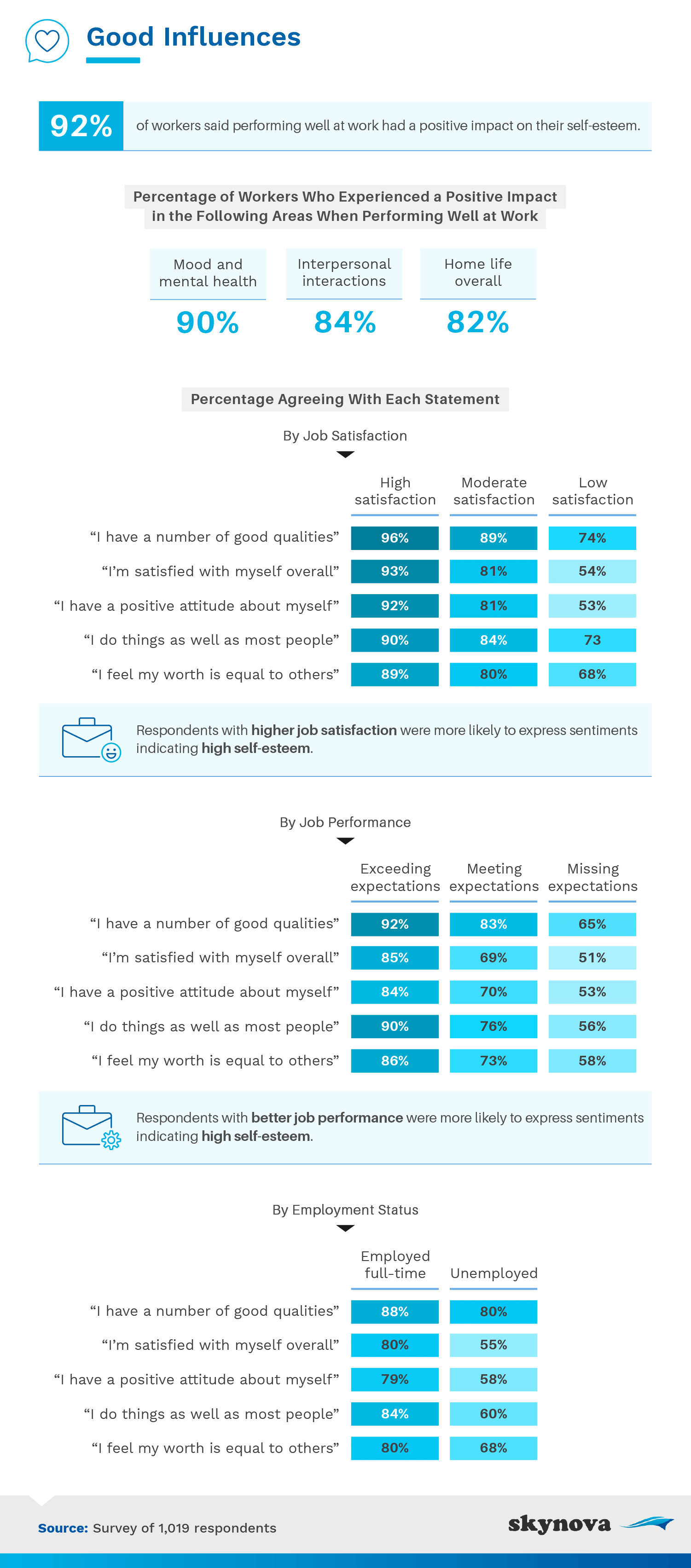
There's a strong connection between mental health and workplace satisfaction. Generally speaking, the more balanced our work lives are and the more invested our employers are in creating a positive working environment, the happier we are in other aspects of our lives. But what about the connection of work performance and mental health? Ninety-two percent of people surveyed acknowledged performing well at work had a positive impact on their sense of self-esteem. More specifically, being good at their jobs positively impacted mood and mental health (90%), interpersonal interactions (84%), and home life overall (82%).
Overwhelmingly, 93% of people who reported high job satisfaction also said they were satisfied with themselves overall, versus 81% of respondents who were moderately satisfied with their jobs, and 54% who reported low satisfaction. Similarly, 92% of people who were highly satisfied with their jobs had a positive attitude towards themselves versus just 53% of those with low job satisfaction.
Beyond being happy with their jobs, people who were happy with the quality of work they produced had a better quality of life and higher self-esteem. Compared to 51% of people who were missing expectations at work, 85% of people exceeding expectations said they were satisfied with their lives overall, and 84% said they take a positive attitude towards themselves. Just 58% of people who felt they were missing expectations at their jobs said they felt they were of equal worth compared to others.
People who struggled to meet expectations at work were aware that their low performance had a negative impact on their mental health and mood.
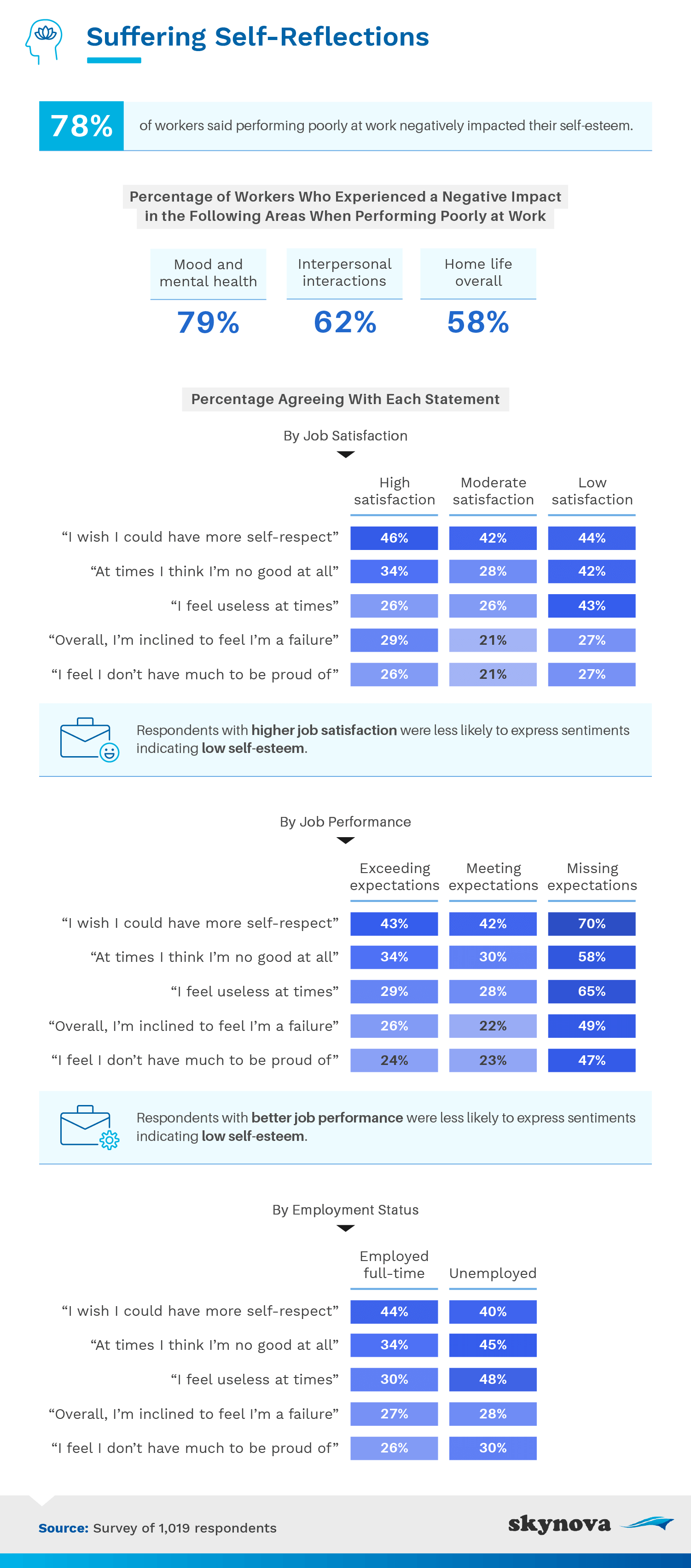
Struggling with work performance doesn't just affect the hours you spend on the clock. People we surveyed detailed how the emotions of underperforming at work can bleed over into your personal life and self-worth. Seventy-eight percent of respondents said performing poorly at work negatively impacted their self-esteem, in addition to their mood and mental health (79%), interpersonal interactions (62%), and home life overall (58%).
With very little difference between those with high and low levels of job satisfaction, between 42% and 46% of respondents admitted they wanted to have more self-respect, but being unhappy at work had other implications. Forty-two percent of people with low job satisfaction said they sometimes think they're no good at all, and another 43% said they occasionally felt useless.
Similarly, job performance had an effect on people's emotional stability and self-worth. Compared to just 29% of those who were exceeding expectations at work, 65% of people who were missing expectations said they sometimes felt useless, and 58% said they sometimes saw themselves as being no good. People missing expectations at work were more likely to want more self-respect by 27 percentage points. As the survey revealed, underperforming at work was more likely to trigger feelings of self-doubt and lower self-esteem than not being employed at all.
A majority of people believed having a good career was a critical component in having a meaningful life, and exceeding expectations at work more commonly correlates to higher levels of self-esteem.
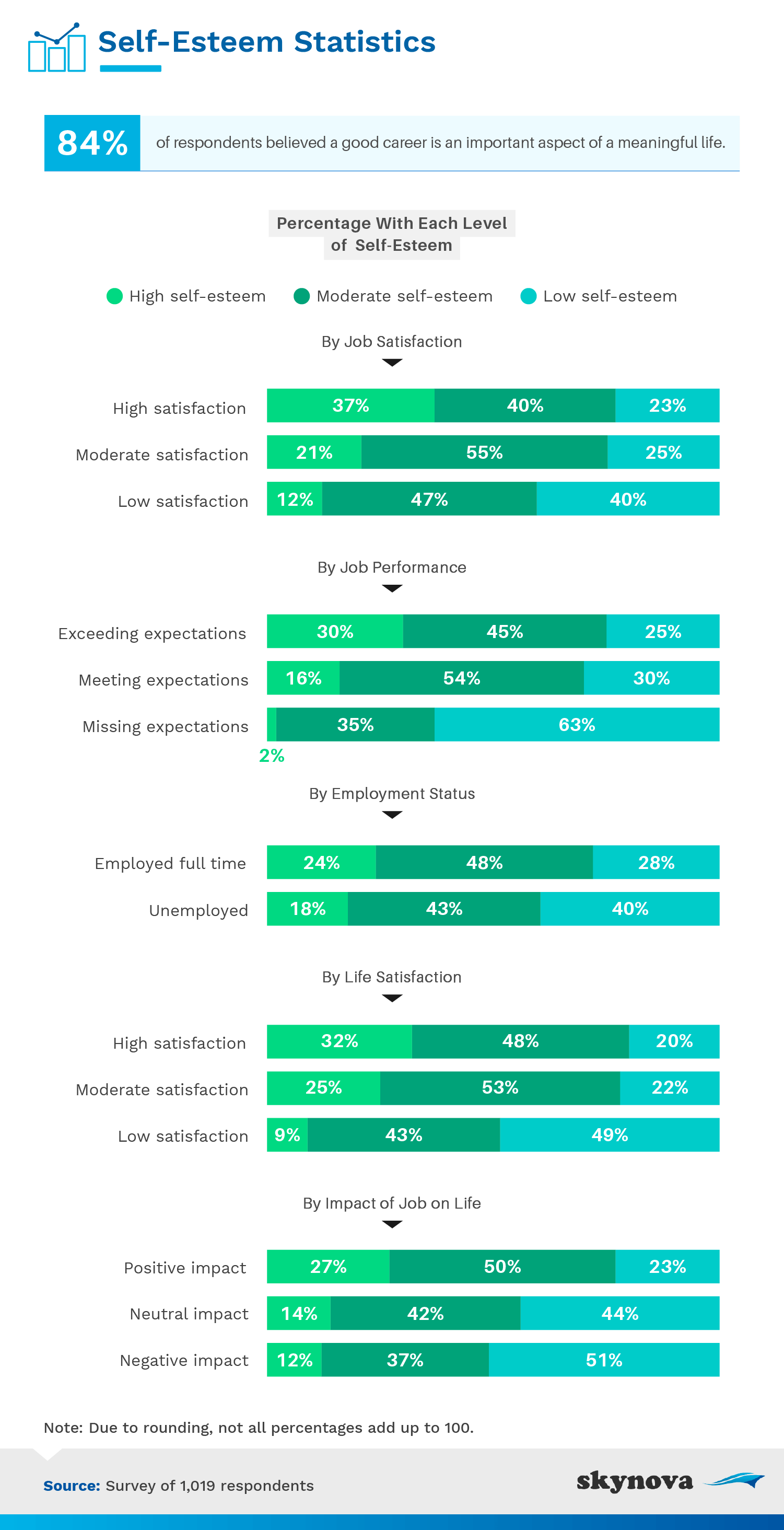
It can be challenging to separate feelings of self-worth from the success or trajectory of our careers. Because our work lives so intricately intersect with our interpersonal relationships, net worth, and status, setting limitations on how we allow our work accomplishments to affect what we feel we've accomplished in our lives can be extraordinarily difficult.
People who were unemployed were more likely to report having low self-esteem compared to those who were employed full-time, and people unsatisfied with their jobs were more likely to have low self-esteem versus those who were happy with where they worked. Still, job performance created a much higher delta between people with low and high levels of self-worth. Thirty percent of people who reported exceeding expectations at work also said they had high self-esteem, versus 63% of people who were missing expectations and reported having low self-worth. Another 49% of people with low overall life satisfaction said they also had a low sense of self-esteem. More than half (51%) of people who said their jobs were having a negative impact on their lives also said they had low self-esteem a.
Many Americans also believed having a successful career was a key component to having higher self-esteem, which leads to higher levels of job and life satisfaction.
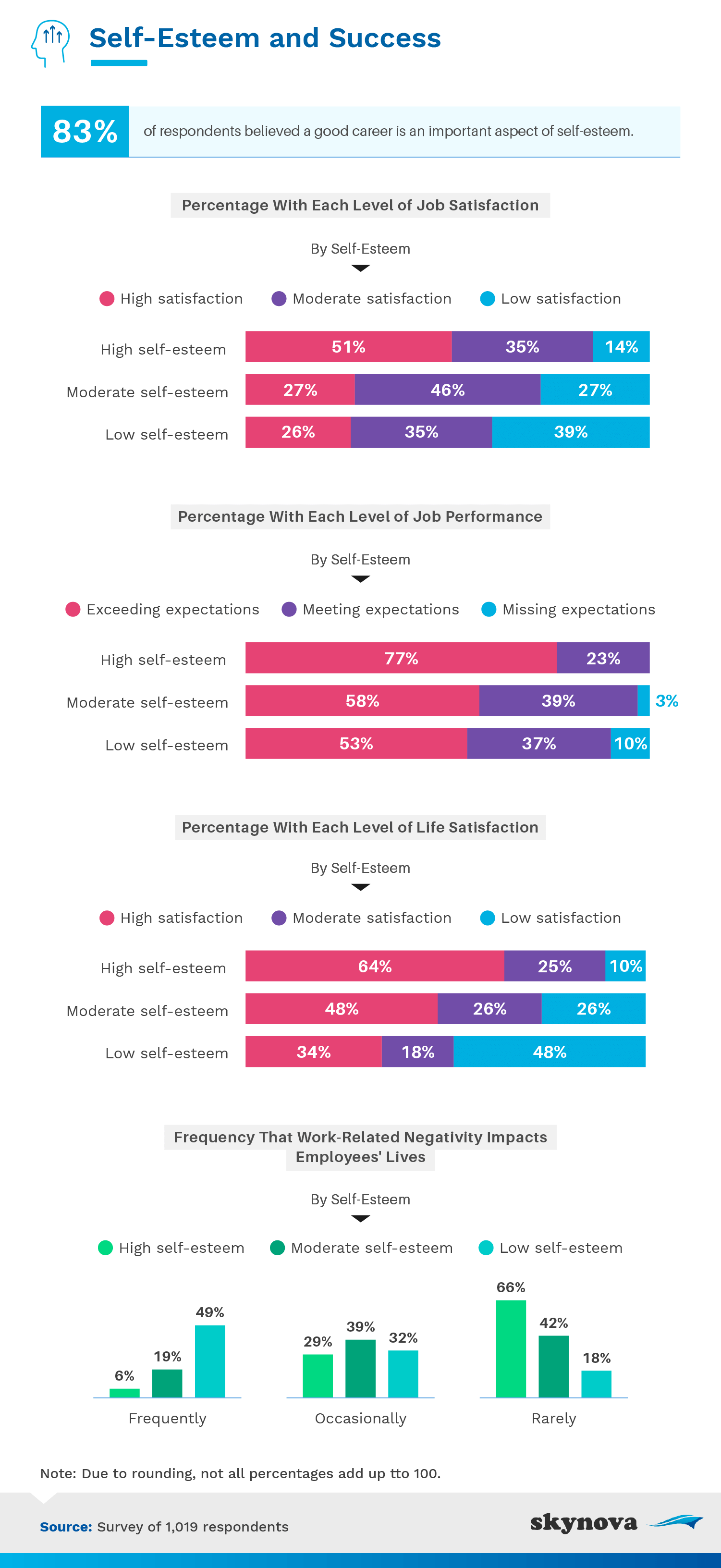
Overwhelmingly, 83% of Americans believed having a good career was an important aspect of their self-esteem. More than half (51%) of people that were happy with their jobs also had high levels of self-esteem. People exceeding expectations in their jobs (77%) were also more likely to report having high self-worth. In fact, no one who reported missing their performance expectations also said they had high self-esteem.
Having a high sense of worth as a result of being happy with your job, or being good at what you do, doesn't just affect your work life. Sixty-four percent of people who were happy with their lives overall also had high self-esteem. Moreover, of the people who said that work-related negativity rarely impacts their personal lives, 66% also reported high self-esteem.
A higher sense of self-worth also leads to feeling satisfied with components of your jobs, including your boss and how much money you get paid.
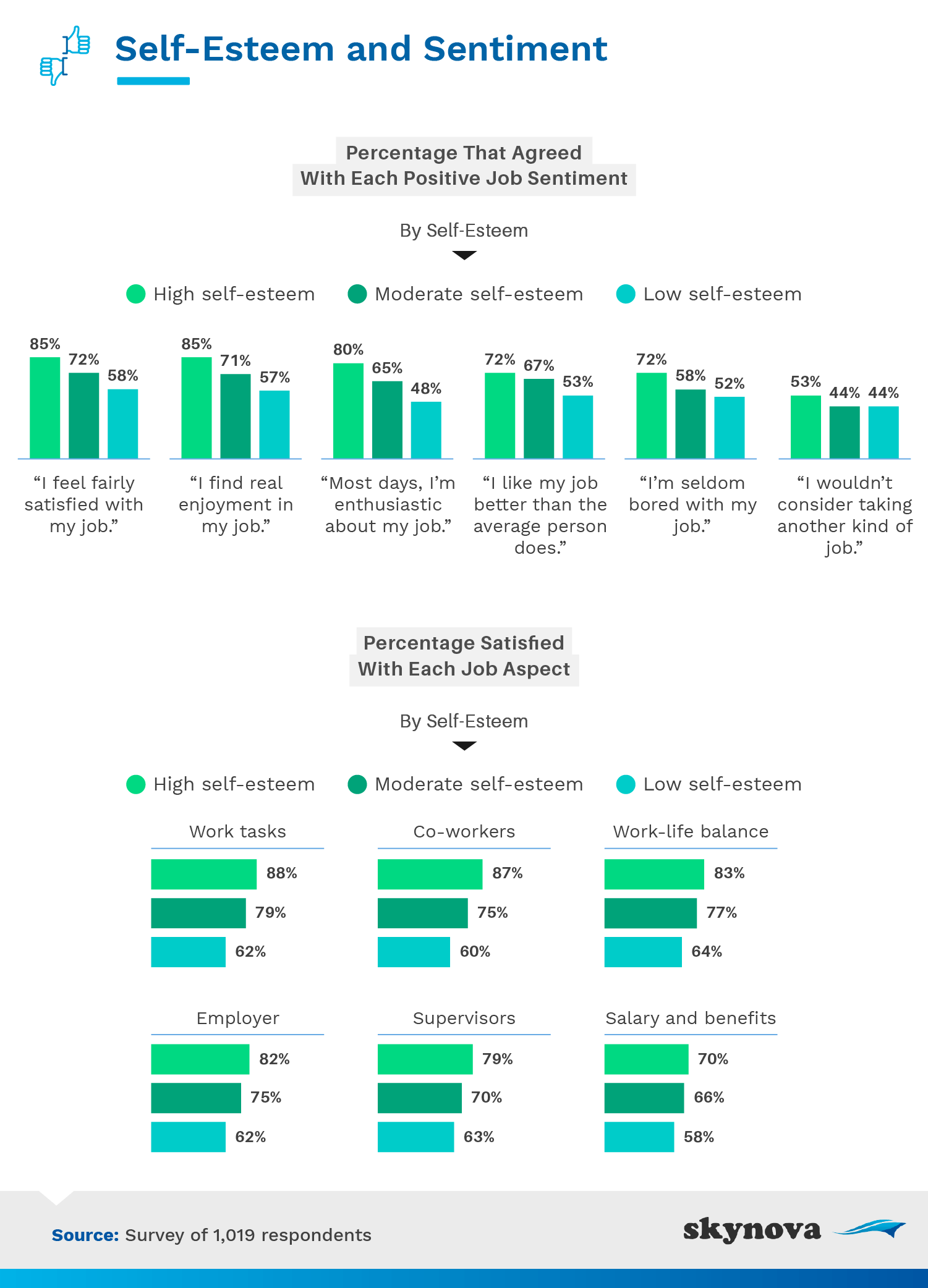
Having high self-esteem and self-worth can create a positive impact in multiple areas of your life. Experts say having a high opinion of your worth, which includes dignity and respect, creates a mindset that allows you to celebrate your accomplishments, learn from your failures, and not react as personally to feedback or criticism. At the end of the day, having a high sense of self-esteem is good for your mental health and makes it easier to cope with stress and feelings of depression.
People surveyed with high levels of self-esteem also reported being more likely to feel satisfied with their jobs (85%), find real enjoyment in their work (85%), feel enthusiastic towards their jobs (80%), and believe they like their jobs better than the average person (72%). Higher self-esteem also led to higher satisfaction with individual components of work, including work tasks (88%), co-workers (87%), and work-life balance (83%). Even external factors were positively impacted by having a higher sense of self worth, including feeling satisfied with your employer (82%), supervisors (79%), and salary and benefits (70%).
A healthy workplace environment positively contributes to mental health and wellness, but less may be understood about the relationship between positive work performance and the effect it can have on self-worth. According to the people we surveyed, feeling good about the work you produce clearly correlated to higher levels of self-esteem, making people feel better about their jobs and lives outside of work.
Skynova provides online invoicing solutions for small businesses helping you look professional, get paid fast, and bill from anywhere at any time. More than just an invoice template, Skynova is made up of 37 unique software modules designed to work separately or together to allow businesses to customize their invoicing software to their specific needs. With accounting and invoicing modules, business proposals, estimates, order conflations, and more, Skynova allows you to mix and match to find the perfect tool to get paid faster. Learn more online at Skynova.com, where you'll find even more small business and workplace reports like this one.
For this study, we surveyed 1,019 respondents with various employment statuses, among whom 814 were employed full-time. 508 respondents were female, 504 were male, 6 identified as nonbinary, and 1 preferred not to disclose their gender. Our respondents ranged in age from 18 to 78, with an average age of 40.
To help ensure accurate data, all respondents were required to identify and correctly answer an attention check question. In some cases, questions and answers have been rephrased for clarity and brevity. These data rely on self-reporting, and self-reported data can be affected by issues including but not limited to attribution errors and selective memory.
We encourage you to share the results of this study on self-esteem and work performance for any noncommercial use. We simply ask that you include a link back to this page so they have full access to our findings and methodology.